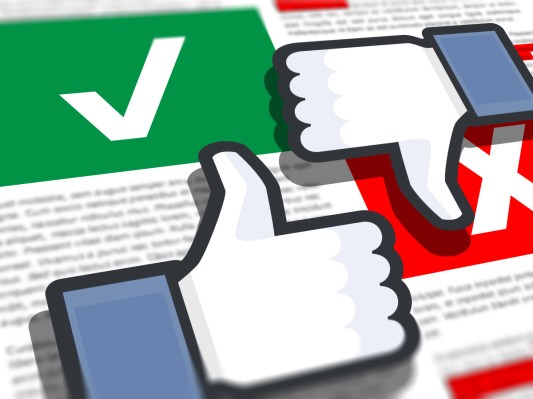Facebook has launched a third counterspeech initiative in Europe, partnering with the not-for-profit Institute for Strategic Dialogue for the launch of the Online Civil Courage Initiative (OCCI), which is aimed at tackling online extremism and hate speech.
COO Sheryl Sandberg launched the initiative in London this morning along with Sasha Havlicek, CEO of the Institute for Strategic Dialogue, and with the UK founding partners for the initiative who are:
- Brendan Cox, Jo Cox Foundation — an organization named after a UK MP who was murdered by a right-wing extremist last year
- Mark Gardner, Community Security Trust — an organization that works to combat antisemitism
- Fiyaz Mughal, Tell MAMA — a support organization for victims of anti-Muslim hate
- Shaukat Warraich, Imams Online — an online information portal that aims to showcase positive Islamic content
The OCCI will commit financial and marketing support to UK NGOs working to counter online extremism, including the four listed above.
Facebook said the aim is to bring together experts to develop best practice and tools for people to engage in counter speech.
The move follows similar initiatives launched by the company in Germany in January 2016 and in France in March 2017. At the initial launch in Germany Facebook pledged more than €1 million in funding for NGOs under the OCCI program.
It’s not clear if Facebook has since expanded its funding commitment for the program — we’ve asked and will update this post with any response.
In the UK the OCCI will provide:
- Training for NGOs to help them to monitor and respond to extremist content, and a dedicated support desk so they can communicate directly with Facebook
- Marketing support for NGOs to undertake counterspeech campaigns through Facebook’s creative shop and Facebook advertising credits
- Best practice sharing with NGOs, government and other online services
- Financial support for academic research on online and offline patterns of extremism — and what makes an effective response
Overall, the initiative aims to enable a community of local organisations and activists to “share campaigns, experiences, advice and challenges” — using Facebook’s own Groups feature as their networking media.
To date, Facebook says OCCI across Europe has engaged in direct training at OCCI Counterspeech Labs and workshops with more than 100 anti-hate and anti-extremism organisations, reaching some 3.5 million people online via — you guessed it — its Facebook page.
The company has previously talked about how counterspeech training is a part of its strategy to tackle online extremism, noting this in its first Hard Questions post — which focused on what it’s doing to counter terrorism.
Hard Questions is a series of policy discussions the company announced and initiated last week, soliciting feedback from users on a variety of questions and concerns — from countering the spread of extremist content to considering whether social media is generally good for democracy?
And given Facebook’s staggering size — with the platform now having amassed nearly two billion users globally — the company has clearly reached a tipping point in terms of realizing it must at very least be seen to be acknowledging it has a responsibility to consider the wider impacts of its platform.
The days of Zuckerberg just being able to shrug his shoulders at concerns by claiming Facebook is just a technology platform are well and truly behind it.
Yet it remains to be seen what practical measures and changes to how Facebook does business will flow from this series of grown up public discussions. And cynical voices might say Facebook is seeking to turn criticism of its platform into increased engagement on its platform.
The company has certainly been facing increased attacks in recent times, including from politicians seeking to scapegoat tech platforms for not doing enough to counter extremism.
And — more broadly — for not taking their social responsibilities seriously enough.
A UK parliamentary committee recently slammed tech giants including Facebook for taking a laissez-faire attitude to content moderation, for example — and suggested the government should look at implementing fines for failures on this front. Something it has said it is considering.
Meanwhile, in Germany, a legislative proposal that includes fines of up to €50M for social media firms failing to promptly remove illegal hate speech after a complaint has gained government backing.
Perhaps we therefore should not be surprised that Facebook revealed a new mission statement yesterday — saying it now wants to: “Give people the power to build community and bring the world closer together.”
It’s certainly a slogan that better aligns with current political priorities in a world that’s sounding increasingly divided and divisive.
And one that Facebook will surely be hoping not merely takes the heat away from its platform, but — via the likes of this expanded counterspeech initiative — works to rechannel the negative energy being directed at its platform and turn it into increase engagement on its platform.
